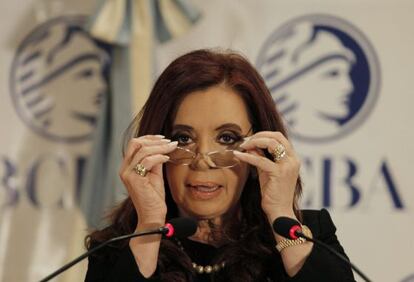Argentina takes action over biodiesel
Kirchner reacts to Spain's cancelation of imports of the fuel


Argentina has upped the ante in its ongoing face-off with Spain over the nationalization of the 51 percent of YPF that was in Repsol's hands.
In April, the government of Mariano Rajoy announced that Spain would stop importing biodiesel from Argentina, which is the world's main exporter of this fuel, in protest at the nationalization of the Spanish oil firm's affiliate.
Now, the government of Cristina Fernández de Kirchner has initiated proceedings against Spain and the European Union before the World Trade Organization (WTO) over the decision. Madrid has 60 days to reply.
Arguing that Repsol had not invested in Argentina, Fernández de Kirchner decided to expropriate YPF on April 16. Four days later, the Spanish government decreed that Argentinean biodiesel would be sourced with European suppliers. In 2011, Argentina sold a third of its exports of this soy-derived fuel to Spain, for a value of 798 million euros, with half of Spain's biodiesel imports coming from Argentina. In the last few months, Argentina has been selling the fuel to Germany and other European countries instead.
The case against Spain has been taken to the World Trade Organization (WTO)
In March, Argentina heard complaints from around 40 countries, including the 27 members of the EU, over its generalized restrictions on imports. Buenos Aires is now denouncing Spain and the EU over the biodiesel issue, after doing the same to Japan and the US last month over those countries' bans on Argentinean lemons and meat.
"In the last few months Argentina has been denouncing in various forums, such as the WTO, the negative effects of numerous existing barriers to our exports," explained the country's foreign relations minister. "World protectionism rests on traditional measures that create distortion, such as high subsidies and tariffs, and a proliferation of environmental, sanitary, phytosanitary and technical barriers with no scientific basis."
After the nationalization of YPF, Spain sought diplomatic support from Latin America, although it only extracted an explicit condemnation from Mexico, whose state oil company, Pemex, is a shareholder in Repsol. At the G-20 summit (Argentina belongs to this group, but not Spain, which is represented by the EU), Rajoy failed to secure a joint condemnation of Argentina, although the heads of state and government, including Fernández de Kirchner herself, declared themselves in favor of "the protection of investments."
Meanwhile, Spain has been putting obstacles in the way of the release of a 142-million-euro loan to Argentina by the InterAmerican Development Bank on the grounds that the conditions need to be analyzed further. Buenos Aires, for its part, has adopted measures that are harmful to Spain's interests, such us limiting ham imports from all sources - Spain is Argentina's third supplier of ham after Brazil and Italy.
In 2011, Argentina sold a third of its exports of this fuel to Spain
And there's more. In July, Argentina announced that from 2013 it will no longer honor its agreement with Spain to prevent double taxation, although it did express a desire to negotiate a new deal. Buenos Aires also canceled similar agreements with Chile, Switzerland and Austria on the grounds that they favor fraud.
In a further attempt to prevent a devaluation of the peso, the Argentinean Central Bank decided that the 80,000 foreigners who receive retirement checks from their countries will be paid in pesos instead of their own currency. The decision hurts Italians in particular, followed by the 24,000 Spanish pensioners who live there.
Tu suscripción se está usando en otro dispositivo
¿Quieres añadir otro usuario a tu suscripción?
Si continúas leyendo en este dispositivo, no se podrá leer en el otro.
FlechaTu suscripción se está usando en otro dispositivo y solo puedes acceder a EL PAÍS desde un dispositivo a la vez.
Si quieres compartir tu cuenta, cambia tu suscripción a la modalidad Premium, así podrás añadir otro usuario. Cada uno accederá con su propia cuenta de email, lo que os permitirá personalizar vuestra experiencia en EL PAÍS.
¿Tienes una suscripción de empresa? Accede aquí para contratar más cuentas.
En el caso de no saber quién está usando tu cuenta, te recomendamos cambiar tu contraseña aquí.
Si decides continuar compartiendo tu cuenta, este mensaje se mostrará en tu dispositivo y en el de la otra persona que está usando tu cuenta de forma indefinida, afectando a tu experiencia de lectura. Puedes consultar aquí los términos y condiciones de la suscripción digital.








































